Veteran thankful for Eagle Cane, having served his country
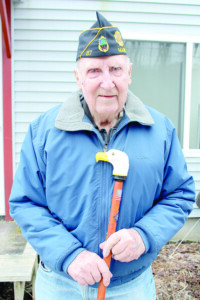
(De Busk Photo)
By Dawn De Busk
Staff Writer
Born and raised on the family farm in Harrison, Harold Leino spent almost two years fighting on the front lines during the Korean War. He was there during the height of action in a conflict that ended up being a short war. It was 1952 and 1953, he said.
“In fact, I was there when they signed the armistice treaty. They stopped shooting at 10 p.m.,” Leino said. “There was none of us that could sleep because it was so quiet. We all thought it was going to start back up. The next morning the Chinese and the North Koreans came out of their trenches and starting waving in surrender.”
The truce, known as the Korean Armistice Agreement, was signed July 27, 1953, and it ended three years of fighting, according to the United Nations History website.
“When I was there, it [gunfire] was 24/7. We were on the front lines. I’ve been shot at. They tried to kill me, but I made it back,” he said. “Some of my best friends were gone within 2 weeks. One was from Vermont; the other from Minnesota.”
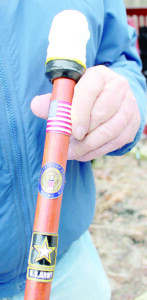
(De Busk Photo)
Leino served in the United States Army, Heavy Mortar Company, 9th Infantry Regiment, 2nd Infantry Division.
Serving in the military during wartime is an experience he will never forget.
“I’m proud that I served in the military, and I would do it again anytime. That never went away. Once I swore to protect this country — it stays with a guy,” Leino said. “Freedom isn’t free. Somebody paid for it dearly. I know a lot of guys did. Most of them who lost their lives were 19 or 20. I was 21 when I was drafted. I was one of the older ones.”
Although he is not one to draw attention to himself, he does appreciate it when other people show their appreciation for his service.
Almost six months ago, on Nov. 7, 2023, some friends gave Leino a ride to the American Legion Post No. 67, where — much to his surprise — he was presented with an American Eagle head cane.
“They came and picked me up. I don’t drive at night anymore. They said, ‘That’s okay. We are going to pick you up,’” Leino explained.
It was not until last week when Post 67 Commander William “Bill” O’Neil’s obituary appeared in the newspaper that Leino decided to talk about the eagle cane he had received.
Praise for Post 67; Praise from family

“Originating in Oklahoma, the Eagle Cane Project was introduced in Maine in 2008. The aim of the project is to present quality, hand-carved and personalized Eagle Head Canes to Maine’s disabled veterans in recognition and appreciation of their service to our country.
The carver assembles the cane, adds the hand-carved eagle head, attaches replica of the requested medals and ribbons, adds the personalization and applies a finish.
Whenever possible, canes are presented in person, accompanies by a certification of appreciation listing names of all the individual who helped in creating the cane.”
— Maine Wood Carvers website, about the Eagle Cane Project
Leino hoped that a newspaper story would bring public attention to the Legion building on Depot Street. The building sits on two acres, and there could be an addition or a porch to the Post, he said. There isn’t enough space inside, he said. If the Legion members want to hold a luncheon or dinner, they have to schedule time at the Bridgton Community Center, he said.
The Legion building can handle small groups. On Wednesday morning, Leino goes to the weekly coffee get-togethers and enjoys the company of other Veterans in the community.
O’Neil had some good ideas and plans to improve the Post building, Leino said. He hopes the next person to be commander will help see to fruition the upgrades and expansion that O’Neil envisioned.
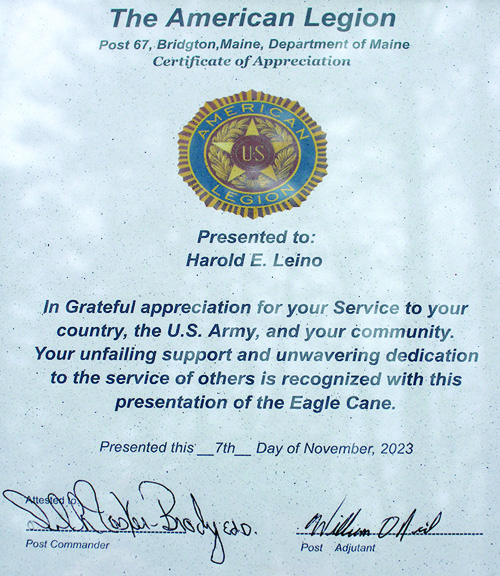
Leino pointed out that O’Neil had signed the ‘Certificate of Appreciation’ that was presented to him along with the eagle head cane in November.
“They pay attention to the Veterans in Bridgton,” he said.
Leino came into The Bridgton News office with his daughter Kathy Leino Furey, who was visiting from Michigan.
“My dad is an amazing man. Besides going through the war, he still cooks and grocery shops and fixes things around the house and stays busy. He still gets his deer every year,” Kathy said.
From a deer blind, Leino clarified.
“I don’t hunt in the woods anymore. I wait for the deer to come to me,” he said.
“He has gotten one every year since he was 13, except for the two years he was in Korea,” Kathy said.
During the Korean War, Leino used 4.2-inch shells that required big guns that were moved around with trucks and trailers, he said. He never wore ear protection. The Army never issued it, he said.
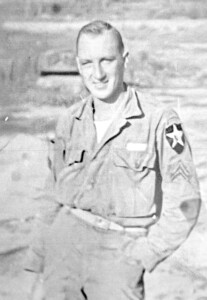
“That is why my hearing is gone. We never had nothing. If you had time to put your fingers in your ear, that was it. There was steady shooting 24 hours,” Leino said.
“It was pretty tough. I had problems when I first got out. Post-traumatic stress bothered me for seven or eight years,” he said.
His daughter recalled him yelling in his sleep sometimes at night during that time period.
“I was born in 1957. That was three or four years after he got out,” she said.
Despite the war nightmares, Leino said he is thankful to be breathing.
“I appreciated everything. Just to be alive,” he said.
“I didn’t think I’d live long enough to see all my kids retire,” he added.
Big family tree with military history
Harold Leino spent most of his adult life in Michigan. That is where he went after serving in the Korean War. In Michigan, he learned heavy machinery mechanics and began his lifelong career. In Michigan, he fell in love with a women, got married and raised a family.
He returned to the town where his roots are: Harrison.
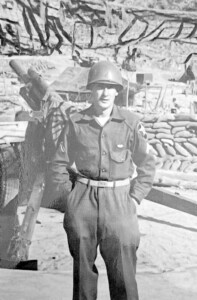
Harold Leino grew up on the family farm on Temple Hill Road. His parents, John and Hilda Leino were proud to have been born in Finland. The couple operated the farm purchased in 1909 by Harold’s grandfather.
The couple had 14 children, nine boys and five girls. These are the names and birth years: Helmi, 1914; Arne, 1916; Matti, 1918; Lempi, 1920; Bruno, 1922; twins Lauri and Henry, 1923; Lila, 1926; Arthur, 1927; Eugene, 1929; Harold, 1931; Martha, 1934; and Walter, 1937.
“Farmers had a lot of children because it meant you would have a lot of help, farm hands,” he said.
However, now and then, a war would call away one of the young men to serve their country overseas. Somehow, all nine boys in the family were drafted during wartime.
All nine young men served in the military and returned home, Harold Leino said.
Veterans' Administration National Center for PTSD, 1-800-273-8255.
Vet built retirement home during 3-week vacation
For three weeks a year, Harold Leino took his vacation time from his job in Michigan and returned with his family to Harrison, where he built his retirement home one project at a time.
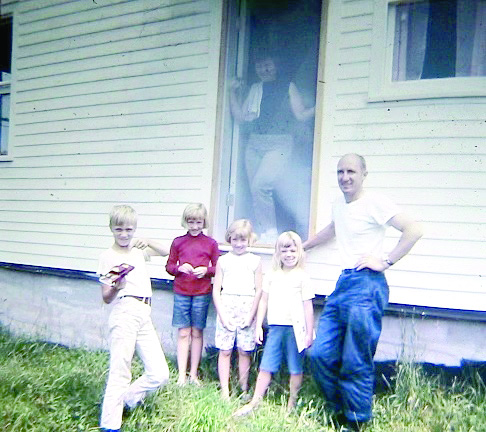
Leino, a 92-year-old Korean War veteran who recently received an Eagle Head cane, talked about his transition from war to family life and from his career to retirement.
This month, his daughter Kathy Leino Furey was visiting from Michigan. She shared in recalling the stories about how the camp grew into a house.
“We would drive in our station wagon out to the camp and spend three weeks. When we were kids, we would come up for three weeks during the summer around July. Every time, dad would work on the house,” she said, listing some of the projects, “Putting up dry wall, building a porch and steps to the front door, putting a furnace in, insulating.”
His summer project time increased as he got more seniority with his job.
“By the time, I retired I got six weeks vacation,” Leino said.
He estimated he started working on the camp in 1964. He moved in full time in 1983.
“We used to call it the cottage but the cottage grew bigger. Now, it’s a house,” Kathy said.
She worked for two summers at Camp Bendito on Island Pond, next to Snowbird Lodge.
“Camp Bendito recruited us in a letter. They recruited a lot of the Leino family. I was 15. I worked as kitchen help with my cousin from New York and one cousin from Maine,” she said.
Kathy experienced a rite of passage: Having a summer job while in high school.
Leino said is pleased with the career path he chose.
After serving in the Korean War, Leino took advantage of the GI bill and became skilled in heavy equipment.
“I went to school in Detroit on the GI bill. I learned mechanics for heavy equipment. I ended up being a teacher. I taught mechanics in Michigan for the last eight years. That was best job I ever had. I had my own training room. I set up all the classes myself,” he said.
Another life-altering experience happened to Leino while he was in Michigan: He fell in love and got married.
“My mom was from Michigan. She was an only child. She always wanted siblings. When she married my dad, she moved into a big family: eight brothers-in-law, and five sisters-in-law,” Kathy said.

